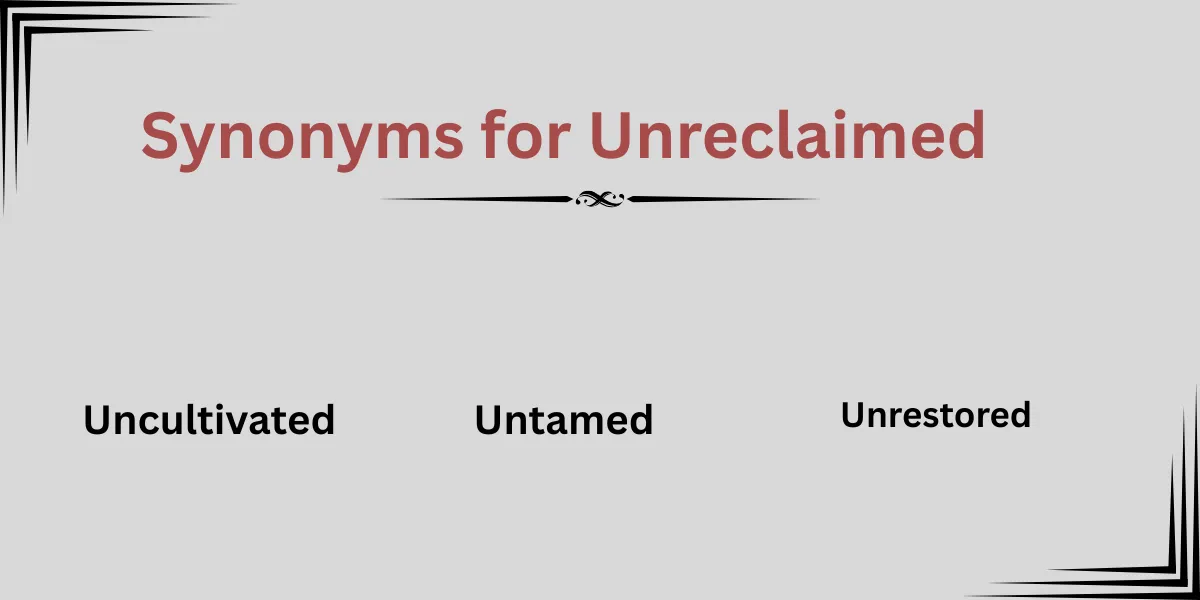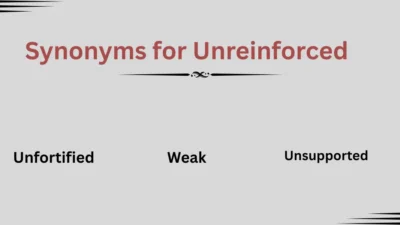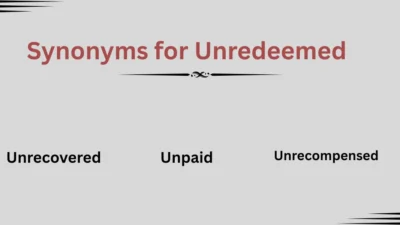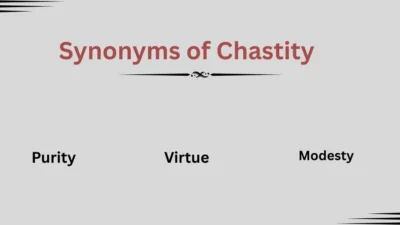Synonyms for unreclaimed, such as untamed, uncultivated, and unrestored, describe land, resources, or even behaviors that have not been reclaimed, improved, or brought under control. For example, unreclaimed farmland may remain wild and untouched, while an unreclaimed habit could continue despite efforts to correct it.
If you’re exploring topics like land management, ecology, or behavioral change, choosing unreclaimed synonyms makes your writing accurate, vivid, and easy to understand.
In this guide, we’ll explore alternatives for unreclaimed, their meanings, and how to use them naturally. Each term emphasizes a slightly different aspect, from natural wildness to lack of improvement or reform.
What Does Unreclaimed Mean?
Unreclaimed refers to something that has not been reclaimed, restored, or brought under control. It can apply to land, resources, or even habits and behaviors.
Unreclaimed things are often associated with:
- Untamed or wild land – areas not cultivated or improved
- Unused resources – materials or property left untouched
- Uncorrected behavior – habits or traits not reformed or addressed
- Unrestored objects – items or spaces not repaired or renewed
It’s not just about being unused — unreclaimed conveys a state of potential, untapped opportunity, or natural wildness that has yet to be transformed or controlled.
30 Synonyms & Related Words for Unreclaimed (And When to Use Them)
1. Untamed
Description: Not domesticated, cultivated, or controlled.
Example: “The untamed wilderness stretched for miles.”
Usage: Dramatic, descriptive; often used for nature or wild behavior.
2. Uncultivated
Description: Not prepared for agriculture, or lacking refinement.
Example: “The field remained uncultivated for years.”
Usage: Neutral; literal for land, figurative for skills or manners.
3. Unrestored
Description: Not repaired, renewed, or returned to a former state.
Example: “The unrestored building was a shadow of its former glory.”
Usage: Formal, descriptive; often for objects, places, or heritage.
4. Unrefined
Description: Not processed, polished, or developed.
Example: “His unrefined manners surprised the guests.”
Usage: Negative or critical; can describe both physical substances and character.
5. Untreated
Description: Not subjected to a specific treatment or process.
Example: “The water was untreated and unsafe to drink.”
Usage: Neutral to critical; literal or metaphorical applications.
6. Raw
Description: Natural, unprocessed, or in a basic state.
Example: “The raw land was full of untapped potential.”
Usage: Neutral; conveys potential or lack of processing.
7. Neglected
Description: Left uncared for or unattended.
Example: “The neglected garden had overgrown weeds everywhere.”
Usage: Critical; emphasizes lack of attention or care.
8. Wild
Description: Existing in a natural state; not domesticated or restrained.
Example: “The wild forest was beautiful but dangerous.”
Usage: Descriptive, dramatic; often used for nature or behavior.
9. Idle
Description: Not in use, inactive, or unproductive.
Example: “The idle land could be converted into farmland.”
Usage: Neutral to slightly critical; can describe resources or efforts.
10. Unredeemed
Description: Not saved, reclaimed, or improved.
Example: “The unredeemed plot of land remained barren.”
Usage: Formal, literary; can imply moral, economic, or social potential.
11. Deserted
Description: Abandoned or left empty.
Example: “The deserted factory echoed with silence.”
Usage: Dramatic or descriptive; emphasizes absence of care.
12. Overgrown
Description: Covered with plants that have grown excessively.
Example: “The overgrown path was nearly invisible.”
Usage: Literal for vegetation; can be metaphorical for neglected projects.
13. Abandoned
Description: Left behind, forsaken, or not maintained.
Example: “The abandoned village slowly crumbled.”
Usage: Strong emotional or critical tone; conveys neglect or loss.
14. Inactive
Description: Not functioning, not engaged, or dormant.
Example: “The inactive machinery rusted over time.”
Usage: Neutral; describes resources, projects, or habits.
15. Untouched
Description: Not altered, affected, or interfered with.
Example: “The untouched forest was a wildlife sanctuary.”
Usage: Positive or neutral; conveys purity or original state.
16. Unimproved
Description: Not enhanced, developed, or modernized.
Example: “The unimproved road made travel difficult.”
Usage: Neutral to critical; emphasizes lack of progress.
17. Fallow
Description: Left unplowed or unproductive, often for regeneration.
Example: “The fallow fields awaited the next planting season.”
Usage: Neutral, agricultural; sometimes metaphorical for inactivity.
18. Unreformed
Description: Not corrected or improved in behavior, structure, or quality.
Example: “His unreformed habits frustrated his family.”
Usage: Moralistic or critical; used for behavior or systems.
19. Rudimentary
Description: Existing in an early, undeveloped stage.
Example: “The rudimentary tools were barely functional.”
Usage: Neutral to descriptive; conveys simplicity or lack of sophistication.
20. Undeveloped
Description: Not grown, constructed, or fully realized.
Example: “The undeveloped land was ideal for a new park.”
Usage: Neutral; often literal for land or figurative for skills.
21. Rawboned
Description: Thin, undeveloped, or unpolished in appearance or form.
Example: “The rawboned structure lacked finishing touches.”
Usage: Literary; conveys stark, unrefined condition.
22. Unprocessed
Description: Not treated or refined through standard procedures.
Example: “The unprocessed wool required careful cleaning.”
Usage: Neutral; practical or technical contexts.
23. Uncultured
Description: Lacking refinement, education, or sophistication.
Example: “His uncultured remarks embarrassed the guests.”
Usage: Critical; often used for social or intellectual contexts.
24. Unpolished
Description: Not made smooth, refined, or elegant.
Example: “Her unpolished skills needed improvement.”
Usage: Neutral to mildly critical; for skills, materials, or presentation.
25. Rough
Description: Uneven, coarse, or unfinished; not softened or developed.
Example: “The rough terrain challenged the hikers.”
Usage: Neutral; literal or figurative; can imply difficulty or lack of refinement.
26. Uncivilized
Description: Lacking culture, refinement, or social order.
Example: “The uncivilized region resisted modern governance.”
Usage: Critical; often historical or anthropological contexts.
27. Wildish
Description: Somewhat wild; partly untamed or unrefined.
Example: “The wildish garden had a natural charm.”
Usage: Light, descriptive; softer than “wild.”
28. Unmanageable
Description: Difficult to control, tame, or direct.
Example: “The unmanageable herd scattered across the valley.”
Usage: Neutral to critical; practical or behavioral contexts.
29. Non-reclaimed
Description: Not restored, retrieved, or processed.
Example: “The non-reclaimed land awaited development.”
Usage: Formal or technical; often used in environmental or industrial contexts.
30. Raw-earth
Description: Literally untouched soil or land; unprocessed.
Example: “The raw-earth landscape stretched toward the horizon.”
Usage: Literal, descriptive; emphasizes original, natural state.
How to Choose the Right Synonym
When selecting a synonym for unreclaimed, consider context, tone, and focus:
- Formal/Literary: Unredeemed, unreformed, rawboned, uncivilized, add sophistication or dramatic weight.
- Neutral/Descriptive: Untouched, raw, undeveloped, uncultivated, fallow are factual and versatile.
- Critical/Judgmental: Neglected, uncultured, unpolished, abandoned, unreformed convey moral, social, or functional critique.
- Casual/Practical: Overgrown, wildish, idle, rough, untamed suit conversational or everyday writing.
- Technical/Environmental: Non-reclaimed, unprocessed, raw-earth work well in industrial, agricultural, or environmental contexts.
Cultural and emotional context matters as well. For example, uncultured can be harsh in social commentary, while untouched may celebrate purity or originality in nature writing. Selecting the right synonym ensures your writing communicates exactly the nuance you intend.
Conclusion
Synonyms for unreclaimed help you describe things that are wild, unused, or not yet improved. Words like untamed, uncultivated, and unrestored each show a different side of being untouched or uncontrolled.
Using the right synonym makes your writing clear and easy to understand. These alternatives help readers see land, resources, or habits in their natural state, showing potential for change or improvement.




